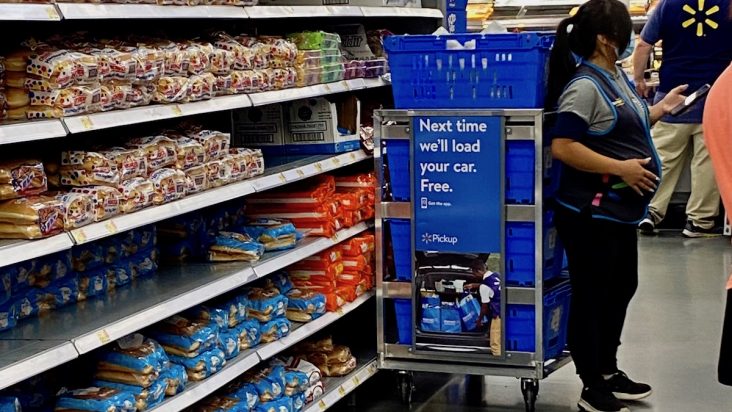Walmart shares sink 9% after lower earnings guidance
by July 25, 2022 5:59 pm 1,775 views

Walmart is the second major big-box retailer to lower earnings guidance in recent weeks as consumer spending on non-essentials is slowing amid the highest price surges for food and fuel in four decades. The retailer’s excess inventory is also weighing down profit potential.
After financial markets closed Monday (July 25), Walmart lowered its second-quarter and full-year earnings guidance by 8% to 9%, and 11% to 13%, respectively. Excluding divestitures, Walmart expects adjusted earnings per share for the full year to decline between 10% and 12%.
The Bentonville-based retail giant said its gross margin remains under pressure as inflationary prices continued to rise in the second quarter for food and consumables. Walmart said operating income for the second quarter and full year is expected to decline between 13% and 14% and 11% and 13%, respectively.
“The increasing levels of food and fuel inflation are affecting how customers spend, and while we’ve made good progress clearing hardline categories, apparel in Walmart U.S. is requiring more markdown dollars. We’re now anticipating more pressure on general merchandise in the back half; however, we’re encouraged by the start we’re seeing on school supplies in Walmart U.S.,” Walmart CEO Doug McMillon said in a statement.
Consolidated net sales growth for the second quarter and full year is expected to be about 7.5% and 4.5%, respectively. Excluding divestitures, consolidated net sales growth for the full year is expected to be about 5.5%.
The higher net sales relate to overall higher prices on everything from General Mills Cereal to Lays Potato Chips. PepsiCo announced recently a 12% price hike in salty snacks and soda prices. The company said in mid-July even with the higher prices they were not seeing a decline in consumer demand. The Walmart supplier also said it was seeing tighter margins and looking to cut costs with cheaper packaging options.
Walmart, like major competitor Target, reported an inventory glut during the first quarter of the year. Target also recently lowered its earnings guidance as it would be marking down prices to move the inventory to ensure the retailer was in good shape for the holidays.
The company maintains its expectations for Walmart U.S. comp sales growth, excluding fuel, of about 3% in the back half of the year. U.S. comp sales are forecast at 6% for the second quarter, when it ends Aug. 1. Walmart said comp sales are higher than previously expected with a heavier mix of food and consumables, which is negatively affecting the gross margin rate. Food inflation is affecting customers’ ability to spend on general merchandise categories and requiring more markdowns to reduce inventory, particularly apparel.
“During the quarter, the company made progress reducing inventory, managing prices to reflect certain supply chain costs and inflation, and reducing storage costs associated with a backlog of shipping containers,” noted Monday’s guidance from Walmart.
Walmart also said it expects to see a 10-cent earnings boost from investments in JD.com and insurance settlements from its operations in Chile. Walmart will report its second-quarter earnings before the market opens on Aug. 16.
Ben Bienvenu, a retail analyst with Stephens Inc., said while the message has been clear that inventory would pressure near-term margins, and investors have been bracing for this, updated commentary shows the magnitude to be larger than Walmart and investors expected.
“We have an overweight (buy) rating on the stock, but our estimates are under review pending further assessment of this update,” he said. (Stephens conducts investment banking services for Walmart and is compensated accordingly.)
Shares of Walmart stock (NYSE: WMT) fell 9.4% in after hour trading following the announcement. Shares traded at $119.59, down $12.43 from Monday’s closing price of $132.02. Over the past 52 weeks, Walmart’s share price has ranged between $117.27 and $160.77. Walmart shares are down 18.74% in value this year.
